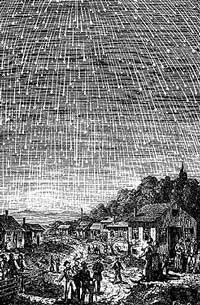Leonid viewing info
From the AP:
Astronomers expect this year's Leonid meteor shower to peak during a half-hour period around 5 a.m. EST on Sunday, when as many as 70 meteors a minute could streak across the sky. If the weather is clear, the shower should be visible from all North American locations.Earthgrazers and Fireballs: The Strange Side of the Leonid Meteor Shower
To best view the shower, head to a dark location far from city lights. The meteors should be visible across the sky, appearing to radiate from the east, in the direction of the constellation Leo that gives the shower its name.
Only a lawn chair, warm clothes and the naked eye are required. Binoculars or telescopes are not necessary.
Many astronomy clubs and observatories plan to hold meteor shower-gazing parties.

The most famous depiction of the 1833 leonids was actually produced in 1889 for Bible Readings for the Home Circle.
Leonids: King of the Meteor Showers
During the three hours of its continuance, the day of judgment was believed to be only waiting for sunrise, and, long after the shower had ceased, the morbid and superstitious still were impressed with the idea that the final day was at least only a week ahead. Impromptu meetings for prayer were held in many places, and many other scenes of religious devotion, or terror, or abandonment of worldly affairs, transpired, under the influence of fear occasioned by so sudden and awful a display.daypop: leonids
Space.com special report: 2001 Leonid Meteor Showers incl.:
How to Photograph Shooting Stars
Earth Orbiting Satellites Brace for Meteor Shower
I still don't know exactly what I'm going to do to see these -- I'm way too close to DC here to be able to easily find a dark sky. Google just turned up this map of DC-area light pollution from 1995 which should get me started. Aha! The Nothern Virginia Astronomy Club has info on 5 preferred dark-sky sites in the region. Now to convince my wife to drag our baby boy out at 4am, crossing our freezing fingers that the show is on...
Meteor Shower to Be No Mere Sprinkle (washingtonpost.com)
Over the centuries, the Leonids have been unpredictable. Even though the Earth passes through the comet's orbit every year, the intensity of the shower depends on the density of the dust stream at that point.Will you be watching?
Decades can pass and the Leonids can be anemic, scientists say. Some years, though, most recently in 1966, the shower can be extraordinary, Chester said. Tomorrow's should be, too.
"This is the best shot you're going to have," he said. "If you don't do it now, you're never going to get the opportunity in your lifetime again."